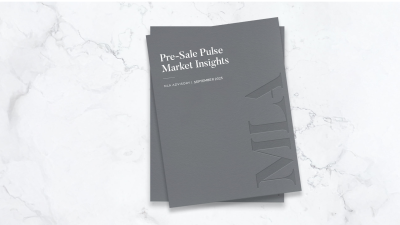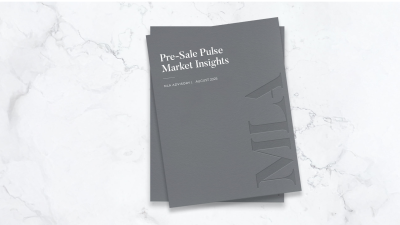While often difficult to establish due to the complexities of the market, forecasting is a fundamental aspect of the real estate industry that allows us to better understand the factors that may affect the future of our market. Forecasting helps us resolve future problems in advance and implement effective planning through an understanding of trends and market influences. To assist us in looking to the future, MLA Canada has forecasted the remainder of the year across the resale product.
There are a variety of points to understand the future of the resale market, including quantifying regular season shifts. Each year, October consistently has a 3.5 to 4% increase in sales over September, for example. Reviewing the 10-year average for the market amid the larger trends observed, we can see that recent months have trended 30 to 40% below the average of their respective months across the last 10 years. Given that we don’t expect an uptick in sales outside of October, we’re able to establish a strong base from which to predict sales in November and December.
A look back at 2022
2022 was nothing if not a rollercoaster of a year, with incredible highs in the first quarter that transitioned to slower, more balanced market activity in recent months. The first three months of the year were exceptionally active, outpacing the 10-year average for resale activity in Greater Vancouver by over 30%. Interest rates, inflation and changing buyer perceptions were standout variables that had an immediate impact on sales volumes in the middle quarters of the year. These caused a steady decline to occur through April and all the way into September.
Looking forward at resale
Looking ahead, we’re expecting sales volumes to increase through October, a trend reflective of seasonal shifts typical in our market, before seeing further declines in November and December. The Bank of Canada has made clear that further rate increases should be expected at the October and December rate announcements. Economists expect that rates will then hold over the medium term. This pressure will have a continued effect on purchasing power and will likely lead people interested in resale products to take pause over the winter months. We’re forecasting just under 29,000 resale transactions for Greater Vancouver in 2022. This will bring resale activity for the year just shy of the 10-year average. As the dust settles, we expect a level of normalcy in market activity as we lead into the 2023 market. MLA Canada expects overall sales volume in 2023 to follow the sales volume seen in 2022, though more spread out and without the same rush to market seen in Q1 of 2021. This will decrease the rate of change seen in this market and allow both buyers and developers the opportunity to get their bearings. Unfortunately, what is likely to follow is another strong run up. The current immigration, pent up demand building, and lack of housing will start to further affect affordability. However, we believe that buyers and sellers have another six to 12 months before we begin to discuss the implications of those outcomes.
Forecasting is a critical part of planning and pre-emptively adapting to future changes in the real estate market. The MLA Canada team brings decades of both qualitative and quantitative experience to best outline what is to come. These predictions are created and shared to predict the state of our market, providing our stakeholders with the real estate intelligence needed to make smart choices in any market state.
DISCLAIMER: The data is provided through various sources such as Zonda Urban, Altus Data Studio, FVREB, and REBGV and is analyzed and interpreted by MLA Advisory. The information, analysis and opinions are compiled through various sources thought to be extremely reliable, although accuracy cannot be guaranteed. MLA Canada or its employees will not be held liable for the information, analysis and opinions herein.


